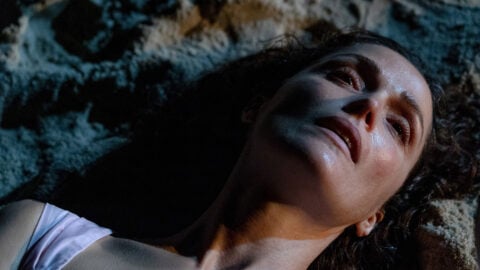Review: Found Memories

In its opening passages, Julia Murat's Found Memories offers a beguiling blend of anthropological observation and formal control. Murat takes us through the daily rituals of Madalena (Sônia Guedes), an elderly woman residing in Jotuombo, a (fictitious) rural village in Brazil. Madalena prepares small loaves of bread in her kitchen by lamplight. She walks along the railroad tracks to the local market, chats with shop owner Antônio (Luiz Serra) about how to arrange the loaves, goes to church, and dines with Jotuombo's fellow aging inhabitants. At night, by the same lamplight, she writes letters to her dead husband, neatly folding each one up and placing it in a large tin.
Murat frames these quotidian events in still, potently centered compositions, and then, as the film immediately cycles through Madalena's schedule for a second time, she tweaks her images with striking, subtle differences of shot distance and camera angle. In producing simple variations on commonplace activities, Murat intertwines a vivid rendering of everyday experience with the appreciation of visual patterns as they form and shift.
Such elemental cinematic pleasures remain foregrounded throughout Found Memories, even as its narrative and aesthetics reconfigure to accommodate Rita (Lisa Fávero), a young photographer whose vague disconnection with modern-day culture leads her to the village. Madalena allows Rita to stay in her home, though the two look at one another warily. As Rita takes an active interest in her life and work, though, Madalena begins introducing her to the townspeople, who regard her with a similar mixture of initial reserve and growing warmth.

With her ever-clicking camera, gentle critiques of Jotuombo's religion-related customs, and wide-eyed admiration for the “old ways” practiced by the village residents, Rita become a fairly transparent stand-in for the director. Murat's own approach to her tradition-minded characters at times uncomfortably straddles the line between thoughtful respect and authenticity fetishism. (Beware any film that lingers a little too long on aged hands kneading bread dough.)
Found Memories thankfully avoids these pitfalls most of the time. The film's best scenes come when Rita and Madalena's divergent worldviews coalesce in unexpected harmony. Photography's value and personal resonance become a recurring theme throughout the film, with Rita's on-the-fly framings juxtaposed with Madalena's stories of poor villagers dressing up for formal portraits by a traveling photographer. When Rita has Madalena stand for her own portrait, the image becomes a tender tribute to the possibility of connection across age, class, and region. It's a helping of art-cinema comfort food to be sure, but one that most closely resembles Madalena's little bread loaves: modest in scale, meticulous in execution, and delivered with a generous spirit.







